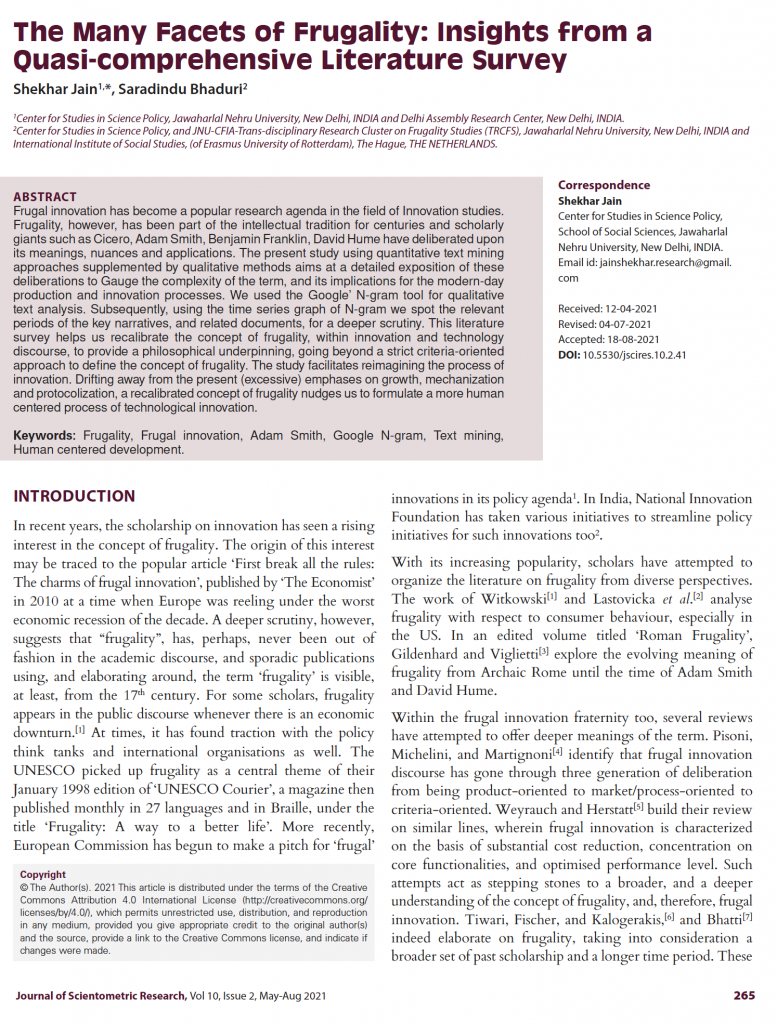FRUGAL INNOVATION AND CSR INTERACTIONS: CREATING VALUE FOR DEVELOPMENT
Frugal Innovation is mainly centred around designing and redesigning of products and services and also the business models that come up with less complexity and reduced costs with increased functionality to have more user value at affordable costs, particularly for low-income groups. Frugal Innovation from the perspective of Management literature has been addressing business opportunities among the marginalized society to sell and produce products at a lower costs through frugal innovation. On the other hand Frugal Innovation from Development Economics perspective has incorporated both top-down and bottom up approaches. Frugal innovation for livelihood enhancement are delivered by people at the Bottom of the Pyramid themselves as an outcome of resource constraints.
Corporate Social Responsibility has been defined in various ways in the literature. Broadly, CSR refers to the policies and decisions undertaken by businessmen consistent with the desired objectives and values of the society. This definition is widely accepted in the literature as it implies going beyond philanthropy for an organization for CSR implementation. Any improvements in CSR process could be termed as Social Innovation focusing on: Social Entrepreneurs as Change agents, Base of the Pyramid, Social Innovations and Eco Innovations encompassing interactions between CSR and Innovation. The interaction between CSR and innovation is largely understood in terms of Value creation through Innovation driven CSR and CSR driven Innovation. An organization may start with one and in turn lead to the other. However proactive CSR is easier to adopt but proactive innovation is difficult as risk is involved with the latter. Thus a proactive CSR can reduce risks of proactive innovation and culminate into a CSR driven Innovation creating Value. Though in India there has been evidence that proactive CSR is also difficult to implement as CSR may imply a higher costs to the SMEs, but pooling of CSR funds at the cluster level for a large impactful CSR project.
Indian economy’s developmental agenda on access to quality health, education and quality environment and livelihood enhancement at the bottom of the pyramid, started getting funded through Corporate Social Responsibility funds of large and medium enterprises. Scaling up their CSR activities aligned with CSR mandate as per the amendment of Company Act 2013, require two percent of the profit to be spent as CSR expenditure. Financing developmental agenda involves high investment. Government of India encouraged Shared Value through such regulatory measures. There has been private participation in developmental agenda of Government of India schemes like “Sarva Shiksha Abhiyan” and “Swach Bharat”. The idea of the concept of Shared Value to create economic and social value at a lower cost, that could benefit a group of institutions together paved the way for such private participation in Government’s development agenda. Various CSR wings of the large organizations like Bharti Foundation and SRF Foundation particularly catered to impart quality education in government schools providing them with the infrastructure. Some innovations like Setting up of Mobile science laboratories in Mobile vans by SRF Foundation caters to the requirement of Science labs in government schools in a particular region. Investing in setting up labs in schools requires a very high investment. Similarly in the context of Energy, an NGO named CLEAN working on clean cooking energy using CSR funds of various companies. It would be interesting to explore how far these innovations could be called Frugal Innovations.
There is a common goal of delivering development agenda to marginalized class in CSR and Frugal Innovation. CSR, being an expensive proposition, there is a scope for Frugal Innovation in reducing costs of green initiatives to curb down energy consumption, providing cost effective health and quality education to people. Less costly process innovations in the microenterprises may bring down energy consumption, saving further future electricity consumption costs. The scope of Frugal Innovation is high in this sector. For example in Foundry sector most of the microenterprises are involved. Foundation of SME clusters have worked closely to impart among them some process innovation in a cost effective manner to achieve better safety standards of the employees along with energy conservation. Can these initiatives be termed as Frugal CSR, where microenterprises, which were not part of a larger CSR Agenda can think of participation in CSR activities?
In the field of Social sectors these organizations can engage themselves in Frugal Innovation to impart Education or vocational training to the under-privileged children of the society, and skill development to the marginalized society. How SMEs can best contribute towards society through frugal innovation is an interesting area of research to explore. Frugal Innovation allows SMEs to participate in the socio-economic development of a nation in a cost effective manner.
The real impact of such innovations would be another area of the study. The real impact of CSR on people’s lives is a debatable area. Case against CSR is centred around that there is no real impact of CSR on people’s lives. It is just a means of Corporations to avoid paying high corporate taxes. Can Frugality in CSR make it more effective and legitimate to the society? Three theories of CSR – Stakeholder theory, Legitimacy Theory and Agency theory – how far we can integrate these theories to Frugal Innovation theory to better understand how far the development agenda of Government of India can be better delivered through a multidisciplinary approach.
This project will focus on the following research questions:
- What is the level of interaction between CSR models and Frugal Innovation when both are meant to be delivered for marginalized and under-privileged classes? Can some Innovative CSR models be termed as frugal within it definitional construct?
- If there is at all any frugality present in CSR models, then the question that arises is can Frugal Innovation in CSR be cost effective?
- Does Frugal Innovation in CSR ensure better participation of micro and small industries in Government’s development Agenda?
- Does Frugal Innovation in CSR create an impact on the socio-economic transition of the communities through creation of social and economic value?
- What are the factors and processes involved to call innovative CSR a Frugal Innovation?

EVENTS
23
Apr
2022Inaugural Workshop
…
- 8:30am - 5:00pm (April 24, 2022)
- TERI Retreat, Gwal Pahari, Faridabad-Gurgaon road, Haryana


